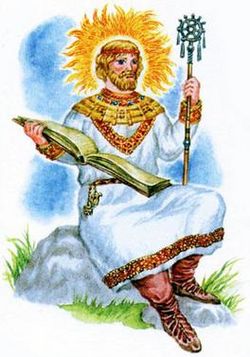Koliada (deity) facts for kids
Quick facts for kids Koliada |
|
|---|---|
| Solar cycle | |

God Koliada by Andrey Mazin
|
Koliada (also spelled Koleda) is a special figure in Slavic mythology. Imagine it as a way ancient Slavs thought about the new sun being born in winter. Koliada also represents the start of a new year's cycle. It's all about how the sun moves through the four seasons, changing from one part of the year to the next.
In different Slavic countries, people celebrated Koliada during a winter festival. They had special rituals, games, and sang songs to honor it, like the koleduvane tradition. In some parts of Russia, the gifts given to people who sang these songs (called "koledari") were also named "kolyada." These gifts were often tasty buns. In the lands of the Croats, Koliada was sometimes shown as a doll. Long ago, Slavs would offer animals like horses, goats, cows, or bears as sacrifices. These animals represented good harvests and new life. Koliada is mentioned in old songs as both a male and a female deity.
Koliada Today: Traditions and Celebrations
Many traditions still remind us of the Koliada deity and its ancient rituals. Most of these celebrations happen around the time of the Winter Solstice, which is the shortest day of the year.
- Koleduvane is an old ceremony with roots in pagan times. It is still performed on Christmas Eve in many Slavic countries. People go from house to house singing songs and wishing good fortune.
- The word "Koleda" is the modern Bulgarian word for Christmas. This shows how old traditions can become part of new holidays.
- Kolyadka, Kolyada, or Kaleda are traditional songs. They are usually sung in Eastern Slavic countries like Belarus and Ukraine. These songs are sung during Orthodox Christmas holidays, typically from January 7th to January 14th.
- The words "Crăciun" in Romanian and "Karácsony" in Hungarian mean Christmas. Both words come from "Korochun" or "Krachun." This was another name for the pagan holiday Koliada. Even though Romania and Hungary are not Slavic countries, they share this linguistic connection.
- "Kalėdos" is the Lithuanian word for Christmas. Lithuania is a Baltic country, but its language also shows a link to this ancient tradition.
Some groups today, called Slavic neopagan communities, want to bring back ancient Slavic beliefs and practices. They work to popularize these old traditions in modern society.
You can also find Koliada mentioned in music! Some Slavic pagan rock and folk rock bands have created songs about Koliada:
- The Russian folk band Ivan Kupala has a song called "Kolyada."
- The Russian pagan metal band Arkona also has a song named "Kolyada."
- The Belarusian pagan metal band Kolo Pravi released a song called "Goy Kolyada."
- The Russian band Veter vody has a song titled "Kolyada."
- The Ukrainian female singer Iryna Fedyshyn has a song called "Kolyada."
- Iryna Fedyshyn also sings "Kolyada my."
- The Ukrainian female singer Iryna Dolya has a song called "Kolyada-kolyadka."
See also
- Slavic deities
- Slavic mythology
- Koledari

